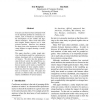Free Online Productivity Tools
i2Speak
i2Symbol
i2OCR
iTex2Img
iWeb2Print
iWeb2Shot
i2Type
iPdf2Split
iPdf2Merge
i2Bopomofo
i2Arabic
i2Style
i2Image
i2PDF
iLatex2Rtf
Sci2ools
106
click to vote
EMNLP
2008
2008
Understanding the Value of Features for Coreference Resolution
In recent years there has been substantial work on the important problem of coreference resolution, most of which has concentrated on the development of new models and algorithmic techniques. These works often show that complex models improve over a weak pairwise baseline. However, less attention has been given to the importance of selecting strong features to support learning a coreference model. This paper describes a rather simple pairwise classification model for coreference resolution, developed with a well-designed set of features. We show that this produces a state-of-the-art system that outperforms systems built with complex models. We suggest that our system can be used as a baseline for the development of more complex models
Complex Models | Coreference Resolution | EMNLP 2008 | Natural Language Processing | Weak Pairwise Baseline |
Related Content
| Added | 29 Oct 2010 |
| Updated | 29 Oct 2010 |
| Type | Conference |
| Year | 2008 |
| Where | EMNLP |
| Authors | Eric Bengtson, Dan Roth |
Comments (0)

